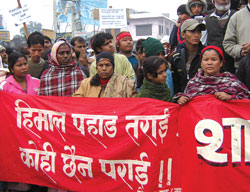|
|
| NICE GESTURE, BUT NOT NEARLY ENOUGH: Peace rallies and marches, such as this one in Nepalganj on Wednesday, do not address the root causes of madhesi grievances. |
The largest Nepali-language newspaper in this country recently criticised the Nepal Sadbhavana Party (Anandi) for its 'dual' characteristics. The paper alleged that the NSP was resorting to agitation even as it enjoyed the fruits of government. The 25 December Madhes banda called by the NSP, and the riots that followed in Nepalganj have raised the hackles of mainstream media, and civil society organisations have also been quoted expressing similar sentiments.
Nepal's senior editors and civil society leaders noticed what the NSP was up to only when the party called a banda. No one has thought it necessary to ask what their demands are and why they are being raised. Who even realises that the NSP isn't isolated in wanting constituencies delineated differently-the entire madhesi community wants that. There's been little written about fully proportionate, representative elections, and no informed analysis of why madhesis feel the interim constitution gives them a raw deal. There is instead verbiage and venom against 'disruption of normal life' in the tarai.
This myopia is scary. Nepal's mainstream press and civil society regularly fail to report and analyse madhesi grievances. What reports exist are alarmist and ill-informed. In part, this is because these groups are pahadi-owned and led, and pahadis have a narrow, uni-dimensional conception of who madhesis are.
Such journalism and civil society activism is a disservice to the country. As members of a society we all need our grievances listened to. How else can we confront, conquer-and then transcend-what are called 'divisive' tendencies.
Yes, the NSP deserves sharp criticism for the violence its banda unleashed.
Nepalganj was smouldering with communal strife days after it ended, and the hills-plains divide was strongly reinforced-madhesi and pahadi groups alike lamented that their businesses, shops, and vehicles had been vandalised by the other side. Such actions should be condemned strongly.
But forming a probe commission, as the government has announced it will do, or appealing for communal harmony, as almost all politicians are doing, will solve nothing. It's hypocritical to appeal for social harmony without addressing the reasons for the grievances.
The vicious Maoist conflict is winding down, but a new one is beginning, rooted in the exclusion and alienation of madhesis. There is a new, legitimate madhesi nationalism taking shape. If it can find proper expression and is engaged with, Nepal will only become stronger. But if it is met with knee-jerk stereotypes and ignorance, then Lord Pashupatinath help this country.
We Nepalis have shown that we can deal with seriously divisive issues in a mature manner-the current peace process is a prime example. Since the mid-1990s, we've managed to put aside our knee-jerk response to janajati identity politics. We desperately need to engage similarly with the Madhes. The first step is listening to why madhesis-and members of every other excluded group-feel the way they do.
The proper place to do that is the forthcoming Constituent Assembly. But the eight political parties have written the rules of the game so lopsidedly, madhesi participation will be limited. Maybe you didn't notice, but the NSP wrote a Note of Dissent precisely about this when the interim constitution was signed. Janajati groups have similar reservations and burnt copies of the interim constitution this week. Add these two populations and it's a real majority. Doesn't look as if the parties are listening.
With all due respect to the parties for their long democratic struggle, they're mis-stepping in a big way. Jana Andolan II revived an exclusionist parliament elected in 1999, and still the members behave as if the constituent assembly is their own, and not the people's. This is why janajati and madhesi groups are so riled.
We better listen up. The choice is fighting with words in the constituent assembly, or taking it to the streets, as happened this week in the
tarai.




